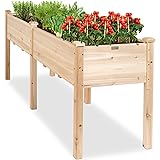Onelike 48'' x 16'' x 55.5'' Plastic Raised Garden Bed with Greenhouse Cover and Trellis, Vertical Tomato Planters for Climbing Plants, Self Watering System Tomatoes Cage for Patio,Black,Large
$99.99 (as of 14:20 GMT -05:00 - More infoProduct prices and availability are accurate as of the date/time indicated and are subject to change. Any price and availability information displayed on [relevant Amazon Site(s), as applicable] at the time of purchase will apply to the purchase of this product.)Best Choice Products 72x23x30in Raised Garden Bed, Elevated Wood Planter Box Stand for Backyard, Patio, Balcony w/Divider Panel, 6 Legs, 300lb Capacity - Natural
17% OffAre you tired of throwing away food waste and watching it end up in landfills? Do you want to reduce your carbon footprint and create a more sustainable lifestyle? Composting is the answer! In this article, we’ll cover everything you need to know about composting, from what it is to troubleshooting problems that may arise. Let’s get started!
What Is Composting?
Composting is the process of breaking down organic matter into nutrient-rich soil. It involves collecting food scraps, yard waste, and other organic materials and placing them in a container or pile with the right mix of ingredients for decomposition. Over time, microorganisms such as bacteria and fungi break down the material, creating compost.
Why Should I Compost?
There are many reasons why you should consider composting. Firstly, it reduces the amount of waste going to landfills, which helps to decrease greenhouse gas emissions and combat climate change. Secondly, it creates rich, healthy soil that can be used to fertilize plants and gardens. Thirdly, it saves money on garbage disposal fees and garden supplies. Finally, it provides an eco-friendly way to dispose of food waste and yard trimmings.
How to Start Composting at Home
Starting a home compost bin is easy! Here are the steps to follow:
1. Choose a location – select an area that receives sunlight but is also sheltered from wind.
2. Select a container – there are many options available including tumblers, bokashi buckets, and worm farms. Alternatively, you can build your own using wooden pallets or wire mesh.
3. Gather ingredients – collect food scraps, yard waste, and other organic materials such as leaves, twigs, and shredded paper.
4. Mix the ingredients – add equal parts “brown” (dry) materials such as leaves and shredded paper, and “green” (wet) materials such as food scraps and grass clippings.
5. Water the mixture – sprinkle water over the materials until they are damp but not soaking wet.
6. Turn the compost – give the mixture a stir every few days to aerate it and speed up decomposition.
The Ingredients of Compost
To make successful compost, you will need a balance of brown and green materials. Brown materials include dry leaves, straw, sawdust, and shredded paper. Green materials include fresh grass clippings, fruit and vegetable peelings, coffee grounds, and eggshells. You can also add manure, wood ash, and comfrey leaves to boost nitrogen levels.
Tips for Successful Composting
Here are some tips to help you achieve success with composting:
1. Keep the ratio of browns to greens consistent.
2. Add water to keep the mixture moist but not soggy.
3. Turn the compost regularly to aerate it and prevent odors.
4. Use a variety of materials to ensure a balanced diet for the microorganisms.
5. Don’t add meat, dairy products, or oily foods as they attract pests and slow down decomposition.
Common Mistakes to Avoid When Composting
While composting is relatively simple, there are some common mistakes that can lead to difficulties. These include:
1. Not mixing the materials properly.
2. Adding too much or too little water.
3. Failing to turn the compost regularly.
4. Using contaminated materials such as plastic or metal.
Using Your Homemade Compost in the Garden
Once your compost has fully decomposed, you can use it to enrich your garden soil. Simply spread it around your plants and dig it into the ground. The nutrients in the compost will feed your plants and improve their growth and yield. If you have excess compost, you can share it with friends or donate it to community gardens.

Troubleshooting Problems with Composting
If you encounter any issues during the composting process, here are some solutions to try:
1. Odors – if your compost smells bad, it could be due to too much moisture or not enough airflow. Try turning the compost more frequently or adding more brown materials.
2. Pests – rodents and insects may be attracted to your compost pile. To deter them, place a layer of hardware cloth or chicken wire over the top of the pile.
3. Slow decomposition – if your compost isn’t breaking down quickly enough, try adding more brown materials or turning the pile more often.
In conclusion, composting is a simple yet effective way to reduce waste and create healthy soil for your garden. By following these guidelines, you can start composting today and enjoy the benefits of this eco-friendly practice.













































